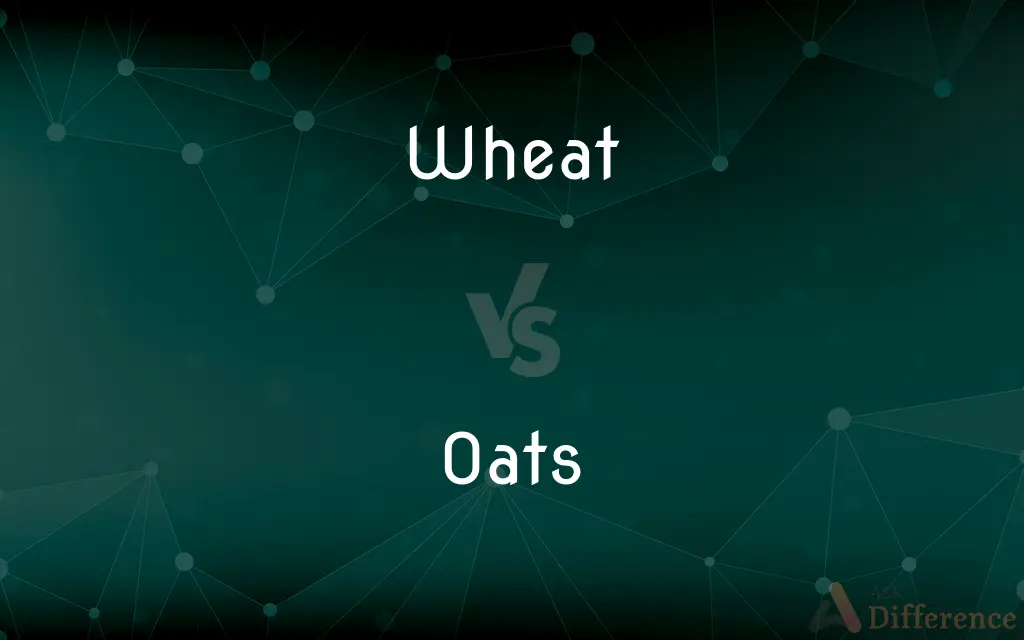Wheat vs. Oats — What's the Difference?
By Fiza Rafique & Urooj Arif — Updated on April 16, 2024
Wheat is primarily used for flour and bread production, featuring a higher gluten content, while oats are valued for their high fiber and are commonly consumed as oatmeal or rolled oats.

Difference Between Wheat and Oats
Table of Contents
ADVERTISEMENT
Key Differences
Wheat is a staple grain known for its high gluten content, which makes it ideal for baking bread and other bakery products due to its elasticity and ability to rise. On the other hand, oats contain a type of soluble fiber called beta-glucan, which has been shown to reduce cholesterol levels and provide substantial health benefits.
Wheat flour is versatile, used in a wide range of products from breads to cakes, largely because of its gluten content that provides structure and texture. Whereas, oats are often processed differently, typically rolled or crushed, and are popular in breakfast cereals, such as oatmeal, due to their creamy texture when cooked.
The cultivation of wheat is extensive worldwide, making it a fundamental crop in global agriculture and a primary food staple in many cultures. On the other hand, oats are less universally cultivated, often grown in cooler climates and traditionally seen as a secondary grain to wheat.
Wheat allergies, including those related to gluten, are relatively common, which can limit its consumption for a significant portion of the population. Oats, while generally considered safe for those with gluten intolerance, can sometimes be contaminated with wheat during processing unless specifically labeled gluten-free.
Wheat can be refined into white flour, stripping away the bran and germ, resulting in lower nutritional content. Conversely, oats are almost always consumed whole, retaining their bran and germ, making them a richer source of nutrients and dietary fiber.
ADVERTISEMENT
Comparison Chart
Primary Use
Bread, pasta, and flour.
Oatmeal, rolled oats.
Gluten Content
High
Gluten-free (unless contaminated)
Cooking Time
Varies by product
Typically quick to cook
Health Benefits
Provides energy, some B vitamins
High in fiber, helps reduce cholesterol
Common Allergies
Wheat allergy, gluten sensitivity
Rare, mainly from cross-contamination
Compare with Definitions
Wheat
A cereal grain primarily cultivated for its flour.
Wheat fields stretch for miles across the Midwest.
Oats
Often eaten whole, preserving their nutrients.
Whole oat grains are an excellent source of dietary fiber.
Wheat
The main ingredient in many breads and pastas.
Wheat pasta offers a different texture and taste compared to other pastas.
Oats
Typically processed into rolled oats or oatmeal.
Rolled oats are perfect for quick morning porridge.
Wheat
Associated with several common allergies.
Products labeled 'gluten-free' are suitable for those allergic to wheat.
Oats
A grain known for its nutritious seeds.
Oats are a popular choice for a hearty breakfast.
Wheat
Can be refined into white flour.
White bread is made from refined wheat.
Oats
Contains beta-glucan, beneficial for heart health.
Oats help in lowering bad cholesterol due to their fiber content.
Wheat
Subject to gluten content, important for baking.
Wheat's gluten is essential for the elastic texture of dough.
Oats
Generally safe for those with gluten intolerance.
Gluten-free oats are processed to avoid cross-contamination with wheat.
Wheat
Wheat is a grass widely cultivated for its seed, a cereal grain which is a worldwide staple food. The many species of wheat together make up the genus Triticum; the most widely grown is common wheat (T. aestivum).
Oats
Any of various grasses of the genus Avena, especially A. sativa, widely cultivated for their edible grains.
Wheat
A cereal which is the most important kind grown in temperate countries, the grain of which is ground to make flour for bread, pasta, pastry, etc.
Oats
The grain of any of these plants, used as food and fodder.
Wheat
Any of various annual cereal grasses of the genus Triticum of the Mediterranean region and southwest Asia, especially T. aestivum, widely cultivated in temperate regions in many varieties for its commercially important edible grain.
Oats
A musical pipe made of an oat straw.
Wheat
The grain of any of these grasses, ground to produce flour used in breads, pasta, and other foods.
Oats
Plural of oat
Wheat
(countable) Any of several cereal grains, of the genus Triticum, that yields flour as used in bakery.
Oats
A mass of oat plants (genus Avena, especially Avena sativa).
Oats are in the north corner of the farm.
Usually oats is last in a rotation and does not get the fertilizer that other feed grains get.
Wheat
(uncountable) A light brown colour, like that of wheat.
Oats
Seeds of an oat plant, especially prepared as food.
Oats is a heart-healthy breakfast food.
Oats are good for you.
Wheat
Wheaten, of a light brown colour, like that of wheat.
Wheat
A cereal grass (Triticum vulgare) and its grain, which furnishes a white flour for bread, and, next to rice, is the grain most largely used by the human race.
Wheat
Annual or biennial grass having erect flower spikes and light brown grains
Wheat
Grains of common wheat; sometimes cooked whole or cracked as cereal; usually ground into flour
Common Curiosities
What is the main use of wheat?
Wheat is mainly used for making flours, which are integral in baking breads, pastas, and other bakery products.
Why might oats be considered healthier than wheat?
Oats retain more of their natural nutrients and are high in beneficial fibers, which can aid in cholesterol management.
How does the gluten content of oats compare to wheat?
Oats naturally do not contain gluten, unlike wheat which is high in gluten.
What are the health benefits of eating oats?
Oats are high in soluble fiber, which can help reduce cholesterol and are generally good for heart health.
How are wheat allergies different from oat sensitivities?
Wheat allergies are more common and can include gluten sensitivity, whereas oat sensitivities are often due to cross-contamination with wheat.
Are oats easy to cook?
Yes, oats cook faster than many grains and are often prepared in just a few minutes when making oatmeal.
Can wheat be consumed in a gluten-free diet?
No, wheat contains gluten and is not suitable for a gluten-free diet.
Is wheat grown more widely than oats?
Yes, wheat is one of the most widely cultivated grains globally, unlike oats, which thrive in cooler climates.
Which grain is better for someone with gluten sensitivity?
Oats are typically safer for individuals with gluten sensitivity, though care must be taken to ensure they are free from wheat contamination.
What is the typical preparation for oats?
Oats are usually rolled or crushed and cooked into oatmeal or used in baking.
What types of products are made from wheat?
Wheat is used in a wide array of products, including bread, pasta, cereal, and many bakery items.
What should consumers with gluten intolerance look for when buying oats?
They should ensure the oats are specifically labeled as gluten-free to avoid cross-contamination with wheat.
Can wheat be part of a heart-healthy diet?
While wheat is nutritious, its refined forms are less beneficial compared to whole grains like oats, which are better for heart health.
What makes oats suitable for a quick breakfast option?
Oats can be quickly made into oatmeal or used in smoothies and other quick recipes due to their easy preparation.
How do wheat and oats differ in their cultivation requirements?
Wheat is adaptable to a variety of climates, whereas oats are best suited for cooler regions.
Share Your Discovery

Previous Comparison
Infiltration vs. Extravasation
Next Comparison
Cake vs. BreadAuthor Spotlight
Written by
Fiza RafiqueFiza Rafique is a skilled content writer at AskDifference.com, where she meticulously refines and enhances written pieces. Drawing from her vast editorial expertise, Fiza ensures clarity, accuracy, and precision in every article. Passionate about language, she continually seeks to elevate the quality of content for readers worldwide.
Co-written by
Urooj ArifUrooj is a skilled content writer at Ask Difference, known for her exceptional ability to simplify complex topics into engaging and informative content. With a passion for research and a flair for clear, concise writing, she consistently delivers articles that resonate with our diverse audience.
















































